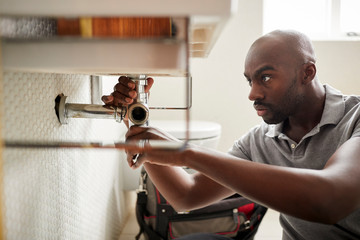Plumbers work on water and sewage systems. These systems include potable water, drainage systems, and sewage systems. A plumber is trained to perform these tasks. In addition, a plumber is able to diagnose problems and resolve them with the use of diagnostic tools. They may also perform emergency repairs and installations.
Plumbers perform a variety of tasks. They troubleshoot plumbing systems and install plumbing fixtures. They also inspect and repair broken pipes. Some plumbers also manage and oversee the selection of materials for plumbing systems. They also install piping systems and hangers and may cut holes in walls or ceiling joints to reach plumbing fixtures. They may also maintain septic systems.
Plumbers plan and install piping systems by studying building plans and inspecting the structure. They also prepare written work cost estimates and keep detailed work reports. They use specific measuring equipment, power tools, and machines to install pipes and bend them at required angles. In addition, they maintain detailed work reports and write up detailed inspection reports.
Plumbers need to be physically fit and strong. They must be able to lift heavy items and work with large machinery. They must be able to safely operate pumps and valves. They may also have to work in high places and balance on narrow beams. Having a license to practice plumbing is an added advantage.
Apprentice plumbers usually obtain their license through an apprenticeship program. This training program typically lasts four to five years and involves both classroom and on-the-job training. Apprentices earn about half the wage of a journeyperson and increase their wages as they progress. Apprentices may also be required to pass a licensing exam. If they pass this examination, they are usually eligible for a state license. Once they have completed the training and passed the licensing exams, they may then begin working as licensed plumbers.
Apprentice plumbers typically work on residential plumbing projects. However, some companies employ plumbers to work on commercial projects. They need to have a solid understanding of plumbing systems. They must also be familiar with a variety of plumbing systems. Plumbing training can help individuals become familiar with the various systems and their parts.
Licensed plumbers earn between $25,000 and $75,000 per year. Apprentice plumbers typically go through an apprenticeship program and complete a written exam to become licensed. Plumbing jobs are largely manual, though some plumbers use machine-driven equipment to install water pipes. Their work can include installing pipes and fittings, including plastic or copper pipes. Plumbers must also be adept at communicating and estimating costs. They may have to work weekends and holidays.
Apprentice plumbers learn from an experienced plumber. Apprentices’ tasks include cutting pipes, cleaning job sites, and answering customers’ questions. Most apprentices have a high school education, but college degrees are not required. They may work for commercial or residential clients. They may also work on commercial construction sites.
The cost of hiring a plumber varies depending on how much work is involved. On average, plumbers charge between PS31 and PS54 per hour, although these rates may vary by location. These rates do not include the cost of materials used in the plumbing job, which can run up to an additional $200.
Generally, a plumber can quote a price over the phone, though most will need to visit your property before giving a final quote. You can also ask about the price before scheduling an appointment. Some plumbing companies charge a minimum fee after completing the visit, so it is a good idea to ask ahead of time.
Plumbing is an incredibly technical profession, and it is vital to hire a licensed professional with the right qualifications. In many states, plumbers must pass a state-approved exam and have a minimum amount of experience. In addition, plumbing is a highly technical field, and a good plumber should be able to perform complex calculations on the spot.
The cost of hiring a plumber varies greatly. You can check local licensing boards for licensed plumbers and learn more about their rates. Some plumbers charge an hourly rate, while others charge a flat rate for the first job. Whether or not they are available on weekends and holidays will also affect the price. If you require the plumber to leave his or her shop for several hours, they will likely charge double or triple the first hour’s rate.

